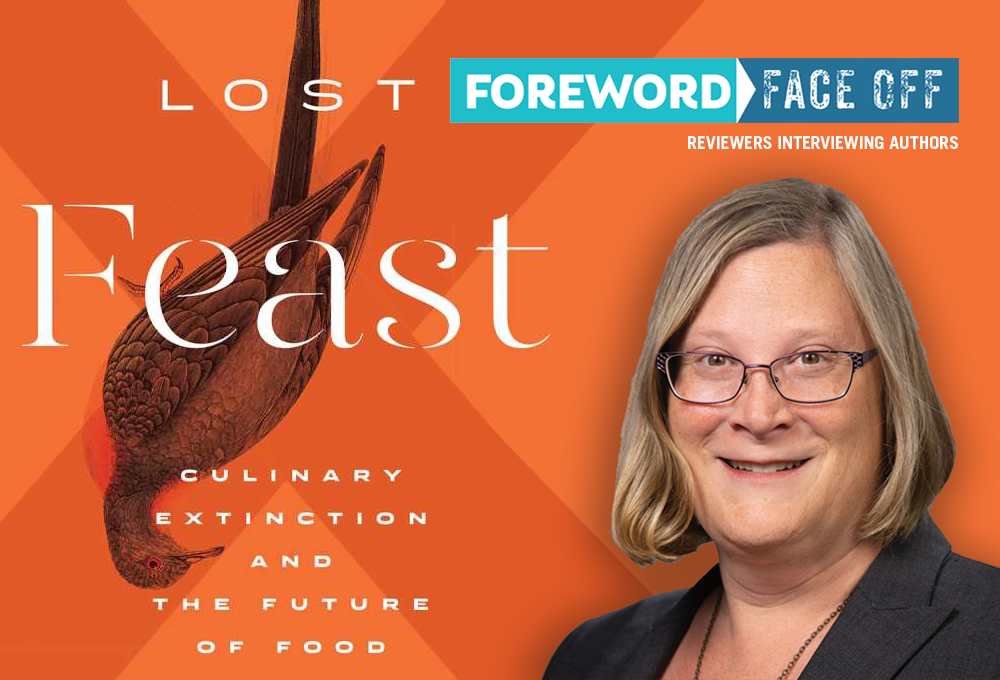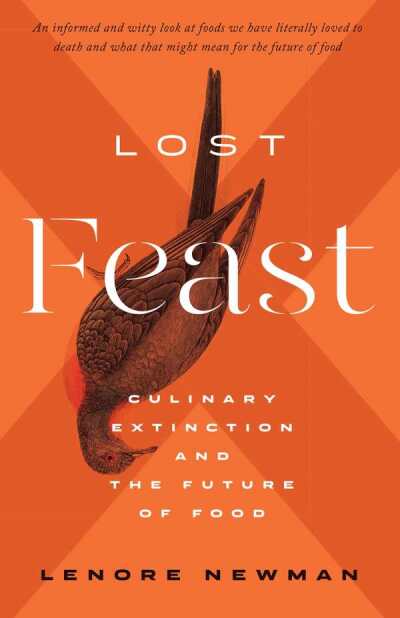Reviewer Rachel Jagareski Interviews Lenore Newman, Author of Lost Feast

Truth be told, most of us are prickly about our food decisions. We DO NOT like being told what to eat.
Even so, we hear the voices in our head whispering about the health, ethical, and environmental consequences of what we consume. It nags at us. So, we make adjustments—less sugar, more local vegetables, no foie gras—and yet the guilt doesn’t completely go away because we know we could always do better. Damn it, man, I just want to eat a Whopper in peace.

Lenore Newman knows our pain. The holder of a Canada Research Chair in Food Security and Environment from her associate professor perch at the University of Fraser Valley in British Columbia, she’s done fieldwork in farmland preservation, global food security, the ecology of the world’s food system, in addition to extensive writing and research on the impact of climate change on cuisine. But Lenore would also be the first to admit she can’t say no to a handful of potato chips. She knows there’s tradeoffs in everything we eat.
Her latest book, Lost Feast: Culinary Extinction and the Future of Food, earned a starred review from Rachel Jagareski in the January/February issue of Foreword Reviews, and an interview between the reviewer and author made too much sense to pass up. Thanks to ECW Press for helping with the details.
Rachel, take it from here.
Some readers may be aware that many of our foods are not grown or harvested for long-term sustainability, but not quite at the alarming levels you describe in your book. As you note, we humans tend to love our favorite foods into extinction. How did the idea for this wide-ranging analysis of human food habits across history and geography come about?
The idea was tickling around in my mind for a while before I realized it was turning into a book. I like to think of it as a bunch of puzzle pieces, or clues to a bigger mystery. I first learned about silphium (an herb highly prized by the ancient Greeks and Romans and eaten into extinction) in a fascinating journal, Petits Propos Culinaires. I started thinking about passenger pigeons after the centenary of their loss. But I think the idea of a book really did come out of the trip to Iceland, and the seagull attack that followed. Sadly, that wasn’t a fictionalized encounter!
Your professorial talents in communicating large, complicated scientific concepts to a general audience are well exhibited in Lost Feast, but I didn’t expect the gorgeous, often witty bits of prose. Descriptions of touring an Icelandic food market as a “hungry wraith of mid-winter,” nibbling on fish “fresh and delicate as snowflakes,” evoke so many senses and emotions. Similarly, your memorable description of Scottish whiskeys—“imbued with brooding peatlands, smelling of wind, long train rides, cozy pubs, and winter nights spent reading gothic novels”—had me jonesing for some single-malt. Do you have literary training tucked into your academic credentials?
I had two real interests as a child: writing and cooking. I wrote fairly consistently through my teen years on an old Smith Corona and very much wanted to go to journalism school. My career, like many, is built out of seemingly random chances—at the end of high school I was awarded a scholarship to study physics at university, and so I went into the sciences instead. However, I frustrated my UBC course advisors by sticking poetry courses in with my quantum physics. I think my dual love of science and writing lead me to a great fondness for the popular scientists of the past. People such as Darwin were basically explorers, scientists, and yet also great writers and orators. Could there be a better job?
Humor and the exercise of ending discussion topics with your “extinction dinners” really enliven the book. Did the idea for these dinners originate when you began your research? Or did it rise organically from your feast partner (college friend and academic colleague Dan) and his enthusiasm for Turducken and other high-octane gastronomic adventures?
The dinners were indeed a late arrival. When I began the project I found the material overwhelming—it was so sad and heavy and I was struggling with some health issues. Some of my friends became quite worried that the book might drive me to extinction, as well. So the dinners began as something soothing, a grounding point back in the world. Slowly they became something more, and as they became part of the narrative, the writing really picked up, as well. I think the dinners in some ways saved the book, and certainly made the writing process more enjoyable (and tasty).
Lost Feast provides so many fascinating explanations for how the North American diet was heavily shaped by the frontier, industrialization, and government policies to become saturated with meat, sweets, and “convenience” foods. How can we radically reshape our diets when these foods continue to be so much cheaper and readily available than alternative ingredients?
This is a huge problem. I’m exposed on a daily basis to the latest food and nutrition science and yet I can’t walk past a bowl of potato chips or say no to a slice of cake. And there is no question that the healthiest foods are more expensive and more difficult to prepare.
I think the best thing we as a society could do is to end subsidies for the foods we know to be harmful in large amounts. We currently subsidize meat, dairy, and sugar and yet broccoli farmers are largely on their own. At the very least we should level the playing field. Some of my friends are surprised that I love stores such as Trader Joe’s where I can buy a big bag of shredded carrots and chopped kale. Yes, I have knife skills, yes, I know how to process raw vegetables, but at the end of a busy day, I just want food to be easy. We need to make good food cheaper than the alternative, and we have to make it easy. Teaching cooking skills is important, too, but the first two really do matter.
Some of your recommendations for changing our food habits may be unappealing to some readers who may be otherwise inclined to follow your ideas, like your view of genetically-modified plants as a faster way to ramp up traditional selection and cross-breeding. Have you received any criticism about this or other ideas you explore in the book?
The strange thing is I expected push back on the genetically-modified foods, but for the most part people seem to be less intensely engaged with the issue. A few people are quite surprised to learn that most cheese is made with genetically-produced vegetable rennet, but somehow the idea of genetic modification did not emerge as a hot button issue.
That said, a lot of people reacted to my critique of cows. I had my first angry email from a stranger over my comments on cows, and readers would engage angrily with each other over the pros and cons of the Beyond Burger! I found that over and over again I had to remind audiences that grass-fed cattle feeding on remote landscapes are a tiny minority of the cattle on the planet. I had to remind them that in the first chapter, I eat an actual lump of butter. The numbers don’t lie, and over the course of researching the book, I discovered oat milk and have been foisting it on everyone who wanders past. But cows, more than anything else, evoke an emotional response. The majority of readers agreed, but I had others really push me there.
Are you hopeful that there is popular support for radically rethinking our current diets and methods of food production in advance of dire environmental collapse? Are you counting on the technologically more proficient, more adaptable, less carnivorous younger generations to lead the way?
I’m an optimist. I think climate change will make the change an absolute necessity, but I also think we are ingenious enough to adapt in a way that makes dinnertime enjoyable, healthy, and affordable. The explosion of interest in plant-based eating is a great sign, and for the most part I’ve been enjoying the parade of new products. I’m still worried; the firestorms in the Amazon and Australia are terrifying—but I really do think people are asking the right questions. Now, if only they would start sending Oatly to Canada.
Rachel Jagareski
